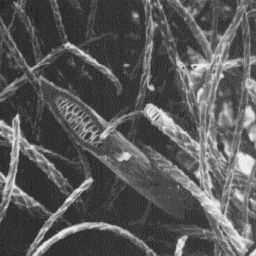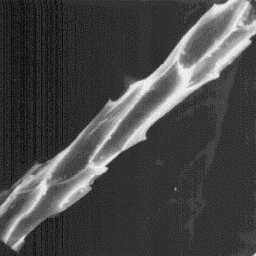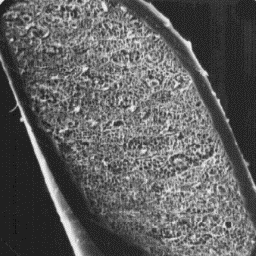 Alopex corsac
Alopex corsac
-------------
English: Corsac fox
German: Steppenfuchs
French: Renard corsac
Spanish: Zorro de Tartaria
Distribution areas
------------------
The corsac is a small kind of fox living
in the prairie areas of Middle Asia from
Caspian sea to Mongolia.
Description of the fur
----------------------
The skins are from 50 to 65 cm long; the A group of hairs of the fine
tail measures about 35 cm. The coat is and guard type, 200x
dense and in the winter yellow-brown in
colour; the summer fur is darker, usually red-brown. The belly part is white
or yellow-white. The underfur layer is grey in colour and about 16 to 18 mm
thick. The coarser hairs are silvery with dark tips. The guard hairs are dark
brown or black in colour. These hairs are straight and about 60 mm long.
|
|
 Alopex corsac
Alopex corsac
-------------
English: Corsac fox
German: Steppenfuchs
French: Renard corsac
Spanish: Zorro de Tartaria
Structure of the hair
---------------------
The microscopic structure of the skin is
furrowed at the surface and the upper part
of the hair follicles is wide with sunken
edges. The average follicle contains more
than one hair shafts, only guard hairs
sometimes occur singly in the follicle.
The cuticular structure
The fine fur fibres are 13 to 27 µm in of the fine fibres, 1500x
diameter and cross-sections are circular in
outline. The cuticular scales are cornet-like in the proximity of the skin
surface but, along the shaft, the scale pattern is of the flat edge-shaped
type, and in the upper part the scales are of a regular petal-like shape. The
surface of the scales is irregularly grooved and the margins are straight.
The medulla is narrow, belonging to the uniserial ladder type. The medulla
column is unbroken longitudinally and the cross-section is central-symmetrical
-shaped. The infilling substance is of a granular structure.
|
|
 Alopex corsac
Alopex corsac
-------------
English: Corsac fox
German: Steppenfuchs
French: Renard corsac
Spanish: Zorro de Tartaria
The intermediate fibres are curled at
the bottom part. The cross-sectional
outline is circular or elliptical and
measures from 30 to 60 µm in diameter. The
cuticular scales are comb-like in shape and
the scale surface is smooth with straight
scale margins. The medulla is of the
central symmetrical shape and is usually
wide and unbroken. The medullary pattern is Longitudinal section
very variable, but mostly is of the of a fine fur fibre, 4000x
lattice-sponge-like type with an inner
medullary substance of a foam-like
structure.
Guard hairs are circular or elliptical in cross-sectional outline, and
from 60 to 75 µm in diameter. The cuticle consists of crenated, tile-like
scales which are smooth on the surface, but usually crenated at the margins.
The medulla is wide, unbroken and central symmetrical-shaped. The medulla is
of the sponge-type with a foam-like infilling substance.
|
|
 Alopex corsac
Alopex corsac
-------------
English: Corsac fox
German: Steppenfuchs
French: Renard corsac
Spanish: Zorro de Tartaria
The cuticular structure
of a guard hair, 1000x
|
|
 Alopex corsac
Alopex corsac
-------------
English: Corsac fox
German: Steppenfuchs
French: Renard corsac
Spanish: Zorro de Tartaria
Longitudinal section
of a guard hair, 600x
Numerical code for corsac fox skin structure
--------------------------------------------
Surface of the skin: 3-1-3
Fine fur fibres: 1-5.11-11-3-1-3-1-1-6-13.27-16.18
Intermediate fibres: 1.2-6-1-1-2-1-1-11-5-30.61-18.31
Guard hairs: 1.2-4-1-2-2-1-1-6-5-60.75-30.61
|




